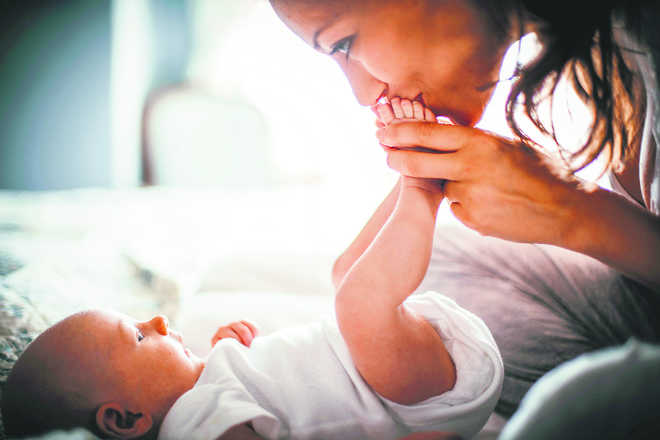How to handle baby''s first winter
Dr Sudhanshu Grover
Looking after new-borns during their first winter is really a tough task for newbie parents as the cold weather can be harsh and punishing, if a few essential things are not observed. During changing weather, cold and flu viruses are in full swing and can affect new-borns and infants under the age of two whose immune system is not strong enough to fight off infections. In a new-born baby, the immune system is still developing and babies are especially vulnerable to infections in the first couple of months.
Here are a few tips for new parents to safely handle baby’s first winter:
Maintain room temperature: Maintaining an ideal room temperature is crucial. An ideal room temperature is between 25 and 28°C. When babies are just a few weeks old, their skin is new and sensitive. So avoid any kind of thermal stress in the first few weeks. Change in room temperature leads to varying conditions of heat stress or cold stress among infants. Cold may cause hypothermia (loss of body heat) which is dangerous. Hence, it’s important for the parents to monitor the room temperature.
Comfortable clothing: In winter, new parents tend to over cover the baby with blanket, jacket, cap, mittens, socks etc. A child should be just adequately clothed. Layers are a crucial but excessive layers can lead to fever or can make the baby cranky. As the baby’s skin is very sensitive, the first layer should be of cotton, followed by woollens. It is recommended that the number of layers for the baby should be just one more extra layer than the mother. For instance if the mother is wearing two layers, a baby should wear three layers. Often, parents rush to doctor if the baby has fever during winter. This can be caused because of the excessive clothing layers. It is also important that the baby should be “comfortable” in all those layers. Don’t forget to take off baby’s layers when coming indoors and to add these back when going outside. Always check if your baby appears too warm in these layers by feeling his/her abdomen, palms and soles.
Use lukewarm water for bathing: Baby can be and should be given a bath every day. But it has to be in a controlled setting. A sponge bath is recommended. A baby should be bathed for just four to five minutes with lukewarm water. It is important that the head of the baby is wiped properly because they tend to lose heat from the head. Infants are prone to dry skin, hence it is important that after bath, moisturiser is applied on their skin.
Avoid excessive use of room heaters: During winter, excessive use of room heaters should be avoided. Blowers can cause excessive dryness of the skin and suck moisture from the air. Dry air can make the child uncomfortable as the secretions increase. Oil radiators are better and help in maintaining humidity and moisture within the room. Feel your baby’s tummy with the dorsum of your hand if you’re not sure they are warm enough. Parents should have a thermometer at home and should also know how to use it correctly.
Use a humidifier: Winter air is cold and dry. Room heaters can make the air in the room even drier, causing the baby’s skin to dry further. It may also cause breathing problems. To avoid this, consider installing a humidifier in the room.
Saline drops: During winter, nasal secretions can become quite thick. This can lead to breathing discomfort in new born babies. Parents can use “saline nasal drops” in case of such secretions or if the breathing of the baby becomes noisy. It helps and prevents breathing discomfort but consult a paediatrician first.
Vaccinations: Vaccinations are recommended in all seasons and it is important for the parents to get their child vaccinated regularly as per the paediatrician’s advice.
Kangaroo mother-care: This is a technique where new-born babies are kept in skin-to-skin contact with the mother. This is especially helpful for premature babies and helps to maintain babies’ temperature. It also helps in reducing infections and improve breastfeeding.
Stay Indoors & avoid crowded areas: Mothers should try to stay in with an infant, especially a new-born, as much as possible during winter. Flu is quite common among infants. Staying indoors helps babies avoid germs from coughs or sneezes of adults or multiple touches from relatives and friends. Less exposure to people means less exposure to germs for the baby. Parents should avoid crowded areas like malls, public places etc.
Moisturise your baby’s skin: To avoid your baby’s skin from becoming dry, use a good moisturiser as recommended. Infants are prone to dry skin hence it is important that post bath, moisturiser is applied on their skin.
— The writer is neonatologist, Cloudnine Group of Hospitals, Chandigarh









